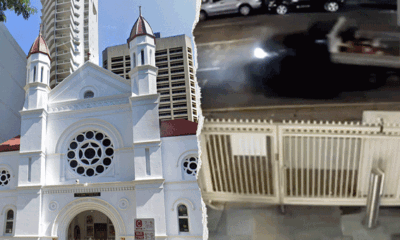INTERNACIONAL
Argentina reveals secret WWII files on Hitler’s henchmen who fled before, after the war
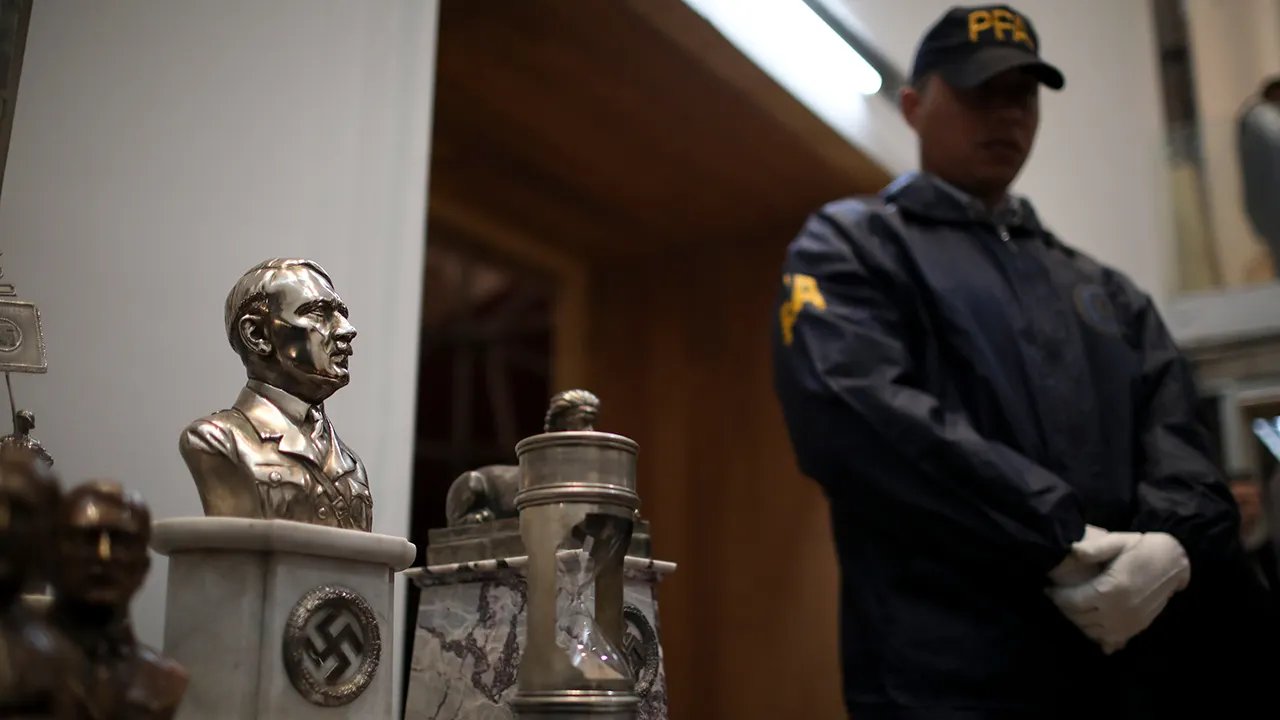
NEWYou can now listen to Fox News articles!
Multiple documents featuring some of the worst Nazi war criminals were released and declassified earlier this year by Argentine President Javier Milei. The more than 1,850 documents comprise thousands of pages detailing the South American country’s efforts to track and verify the whereabouts of thousands of Nazis who fled Europe after World War II.
The catalyst for the effort came from the Senate Judiciary Committee and Chairman Chuck Grassley, R-Iowa, who was credited by the Simon Wiesenthal Center for his efforts in getting Milei to release the documents.
Most of the materials relate to investigations carried out between the late 1950s and the 1980s and were digitized and made available on the nation’s General Archive website, along with secret, declassified presidential decrees from 1957 to 2005.
The original batch of documents released online is divided into seven large files roughly centered around the main Nazi criminals covered in them. There are multiple documents related to Adolf Eichmann, the engineer of the «Final Solution,» the plan for the extermination of European Jewry. He lived under the name Ricardo Klement around Buenos Aires until being captured by Mossad agents on Argentine soil and taken in a secret operation to stand trial in Jerusalem in 1960.
101-YEAR-OLD KRISTALLNACHT SURVIVOR WARNS CURRENT ERA ‘EQUIVALENT TO 1938’ ON ANNIVERSARY OF NAZI RIOT
Adolf Eichmann, in a bulletproof cabin, puts on earphones to hear the reading of the act of accusation against him, Dec. 17, 1961. He was in charge of the extermination of Jews in Poland and then organized the deportation and extermination of Jews in 13 European countries. (Keystone-France/Gamma-Keystone via Getty Images)
Eichmann’s case features prominently in the files and there is contradicting evidence that the leftist, populist government of Juan Perón not only knew Eichmann was in the country but also made efforts to protect him.
Multiple documents also exist detailing the lives of Josef Mengele, the «angel of death» doctor from Auschwitz-Birkenau camps who lived in Argentina and escaped to Paraguay and Brazil, where he died in 1979.
Documents detailing the hunt for Martin Bormann, Hitler’s lieutenant and right-hand man, as well as Croatian murderer, Ante Pavelic, deputy führer and defector Rudolf Hoess and the so-called «butcher of Lyon,» Klaus Barbie, received special attention in the files.
NAZI OFFICER’S DAUGHTER CHARGED AFTER STOLEN WWII PAINTING SPOTTED IN REAL ESTATE LISTING
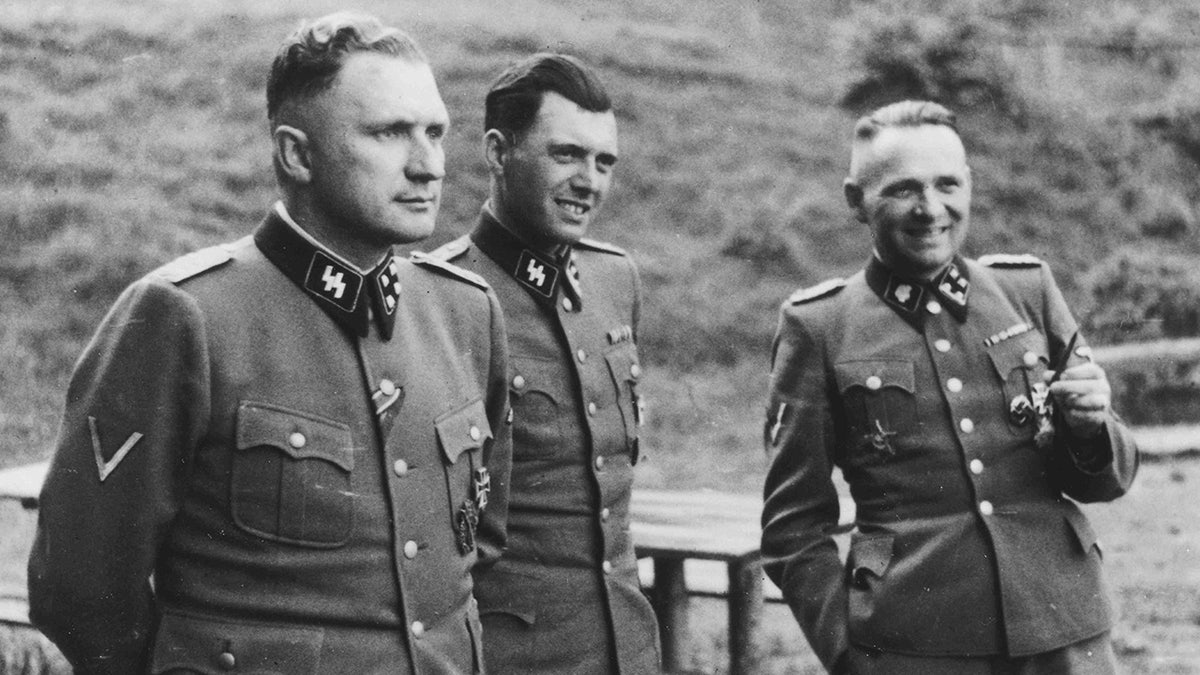
Three SS officers socialize on the grounds of the SS retreat outside of Auschwitz, 1944. From left to right they are: Richard Baer (commandant of Auschwitz), Dr. Josef Mengele and Rudolf Hoess (the former Auschwitz commandant). Mengele escaped to Argentina, later escaping to Paraguay and Brazil. (Universal History Archive/Universal Images Group via Getty Images)
According to Harley Lippman, a member of the United States Commission for the Preservation of America’s Heritage Abroad and a board member of the European Jewish Association, the relevance of the release of the Argentinian documents cannot be understated.
«There are numerous questions that these documents can bring light to why a sophisticated society, far from the plagues of European antisemitism such as Argentina’s, agreed to hide Nazi criminals and their secrets for so long. What happened to the U-boats loaded with Nazi gold brought to the country and given to the authorities?» he asked.
«On the one hand, it is shameful that Argentina kept these documents a secret for so long, but on the other hand, we also need to acknowledge the enormous efforts being made by this government to make these documents public. While the historical significance is important, this is more important for Argentinians to be able to confront their demons as a society than for Jews,» Lippman said.
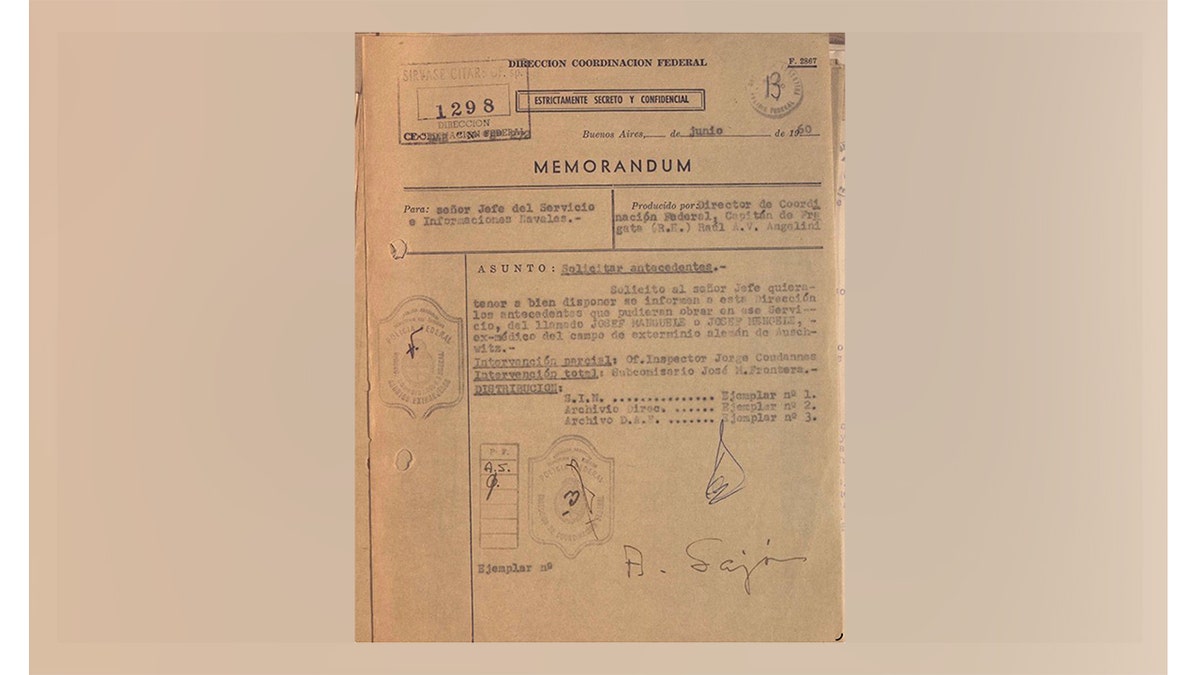
This 1950 Argentine federal police memo, marked strictly secret and confidential, seeks intelligence on Josef Mengele, the notorious Nazi doctor from Auschwitz, suggesting that Argentine authorities were aware of his possible presence or activity in the region at that time. (General Archives of the Government of Argentina)
Adding to the large reveal, in May, while the Supreme Court of Argentina was undergoing renovations and transferring document collections to museums, a forgotten trove of 83 boxes of Nazi documents was discovered almost untouched in the basement of the institution. Upon inspection, the crates revealed documents intercepted by Argentine customs in 1941, sent from the German Third Reich Embassy in Tokyo, Japan, to Argentina’s capital, Buenos Aires, aboard the Japanese steamer Nan-a-Maru.
The documents had been sent as personal effects of embassy personnel but were intercepted under orders of the country’s minister for foreign affairs in order not to undermine Argentina’s neutral position in the war. The shipment became the subject of a probe by a commission investigating «anti-Argentine activities,» which led to the seizure and possession of the crates by the country’s supreme court, where they remained for nearly 84 years.
The finding of the boxes revealed multiple materials intended to propagate and consolidate the Third Reich’s and Hitler’s ideologies in Argentina and South America, possibly in an effort to bring neutral countries under the auspices of Germany.
MILEI SCORES HISTORIC WIN IN ARGENTINA MIDTERMS, TIGHTENS GRIP ON CONGRESS
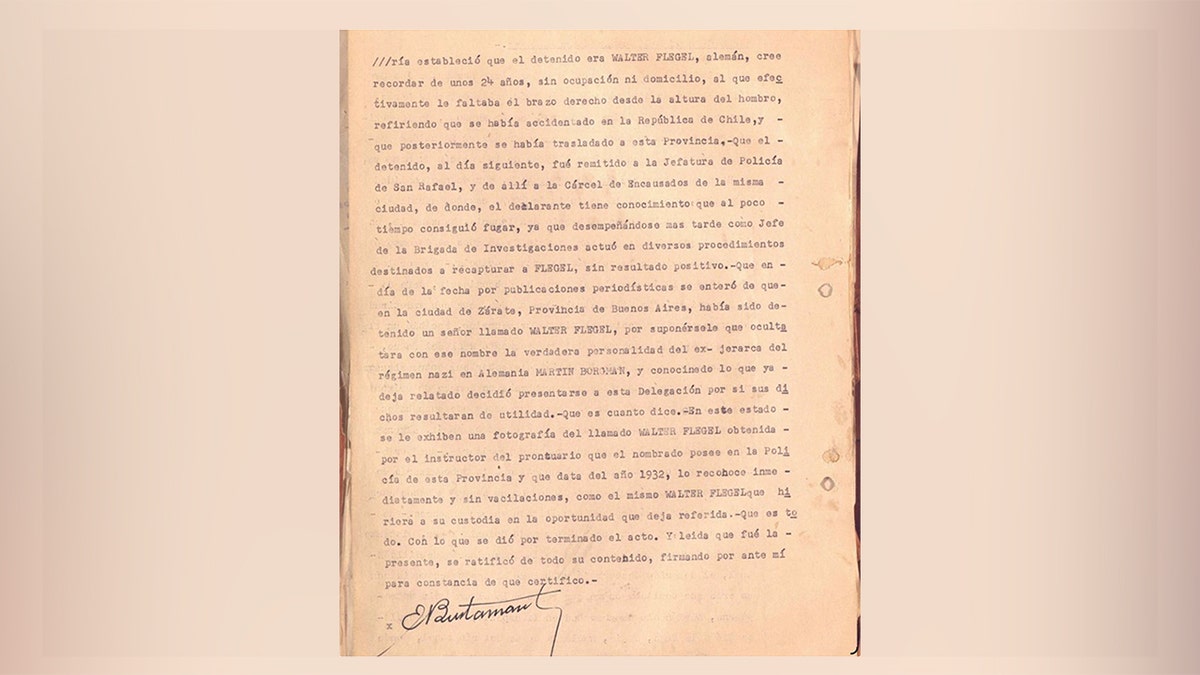
The document recounts an Argentine police report describing a German fugitive, Walter Flegel, believed by some to be Martin Bormann, Hitler’s former deputy, living under a false identity in Argentina. It was later proven that the lead was incorrect and that Flegal was not Borman. Earlier this year, Argentina President Javier Milei declassified and released over 1,850 documents detailing Argentina’s efforts to track and verify the whereabouts of thousands of Nazi war criminals. (General Archives of the Government of Argentina)
After opening the boxes along with prominent members of the country’s Jewish community, the court issued a statement saying that «given the historical relevance of the find and the potential crucial information it could contain to clarify events related to the Holocaust,» an exhaustive survey of all the material was ordered.
The contents of the crates have not yet been made public, but Milei’s office has said that once all the documents have been digitized, they will also be declassified and made available.
Argentina’s chief of the Cabinet of Ministers, Guillermo Francos, has previously said Milei gave the order «because there is no reason to continue withholding that information, and it is no longer in the interest of the Republic of Argentina to keep such secrets.»
«Jews after World War II lived a golden age of about 80 years where antisemitism had subsided, at least apparently, and they could be productive and contributing members of society. This has now ended — partially because of the genocide committed against Israelis by Hamas on Oct. 7, 2023, with world opinion projecting on Israelis and Jews the false role of perpetrators of genocide in the war in Gaza, but also by bringing back the same old antisemitic views that had been alive in Germany and before then,» Lippman says.
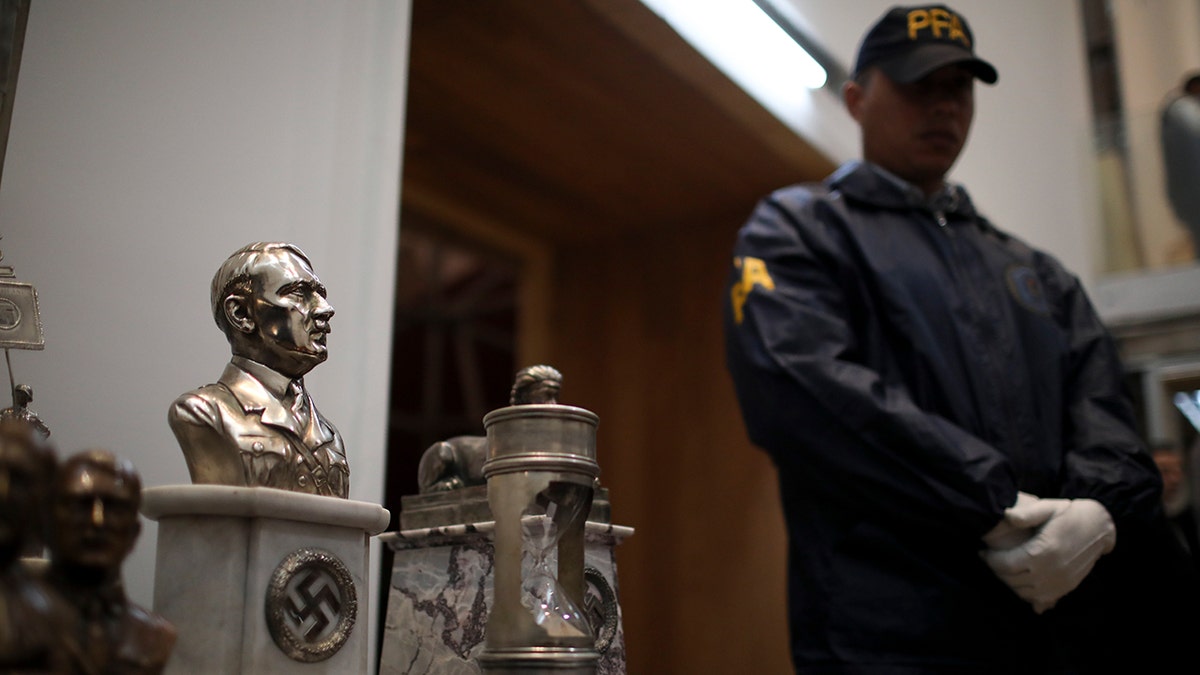
A police officer stands in front of a cache of Nazi artifacts discovered in 2017, during a press conference in Buenos Aires, Argentina, Wednesday, Oct. 2, 2019. Argentine authorities found the cache in a secret room behind a bookcase and had uncovered the collection in the course of a wider investigation into artwork of suspicious origin found at a gallery in Buenos Aires. (Natacha Pisarenko/AP Photo)
«The fact that many people under 30 do not know or understand [the meaning of] the Holocaust is part of the reason why antisemitism is on the rise again. «The Holocaust was the largest systematic industrial killing of humans in history. This happened only 80 years ago. Young people seem not to be able to grasp the scale of this, but these documents can bring back the memory of what the Holocaust really was,» he said, comparing the propaganda war currently faced by Israel and Jews under a progressive and projectionist guise.
CLICK HERE TO DOWNLOAD THE FOX NEWS APP
Beyond the lives of senior Nazis who escaped to South America on the so-called «ratlines»—possibly under the auspices of certain local governments—Lippman said the documents could also provide important information regarding the role played by Swiss and Argentine banks.
«The Holocaust was the greatest theft in history. Many Swiss banks [which were the depositaries of Jewish money] would not release funds to sometimes a sole survivor from a family who perished in the Holocaust without a death certificate for their loved ones. But Auschwitz did not issue death certificates — they only issued ashes.»
anti semitism,south america,world war two,israel,holocaust
INTERNACIONAL
Putin puts ‘nuclear triad’ on fast track, Zelenskyy claims ‘World War 3’ underway

NEWYou can now listen to Fox News articles!
President Vladimir Putin said the development of Russia’s nuclear triad was an «absolute priority» Monday as he outlined the country’s stance on its weapons program, according to reports.
Marking Russia’s Defender of the Fatherland Day, the Russian leader spoke about strengthening the country’s nuclear capabilities before presenting state awards to officers involved in the invasion of Ukraine, the Moscow Times reported.
In his speech, Putin referred to the Russian nuclear triad, which is the country’s three-pronged system for delivering nuclear weapons, designed to ensure a credible second-strike capability.
Putin described its development as «an absolute priority,» saying that it «guarantees Russia’s security and ensures effective strategic deterrence and a balance of forces in the world.»
President Vladimir Putin declares Russia’s nuclear triad development an «absolute priority» on Defender of the Fatherland Day, emphasizing strategic deterrence capabilities. ( Contributor/Getty Images)
Putin also emphasized his country would continue to strengthen its army and navy, «taking into account developments in the international situation, based on combat experience gained,» amid the Russia-Ukraine war.
He added that Russia would also «significantly» enhance the capabilities of other branches of the armed forces, increasing their combat readiness, mobility, and ability to operate in all conditions, even the most challenging.
«And, of course, we will accelerate the development of advanced systems for the armed forces,» he added.
Putin’s remarks came after Russia suspended its participation in the New START Treaty on Feb. 5, 2023, the last remaining nuclear arms control agreement between Moscow and Washington.
RUSSIA FIRES NEW HYPERSONIC MISSILE IN MASSIVE UKRAINE ATTACK, KREMLIN SAYS

Ukrainian President Volodymyr Zelenskyy warns the Russian leader has launched «World War III.»
The treaty limited the number of deployed strategic nuclear warheads and delivery systems each country could have.
Russian officials have said they will continue to take a «responsible» approach to managing their strategic nuclear arsenal and would respect previously established limits.
Putin’s announcement came after Ukrainian President Volodymyr Zelenskyy warned that the Russian leader had effectively launched «World War III» with his invasion of Ukraine four years ago.
«I believe that Putin has already started it. The question is how much territory he will be able to seize and how to stop him… Putin will not stop at Ukraine,» Zelenskyy told the BBC in an interview Feb. 23.
RUSSIA SHIFTS FROM TALK TO ACTION, TARGETING NATO HOMELAND AMID FEARS OF GLOBAL WAR
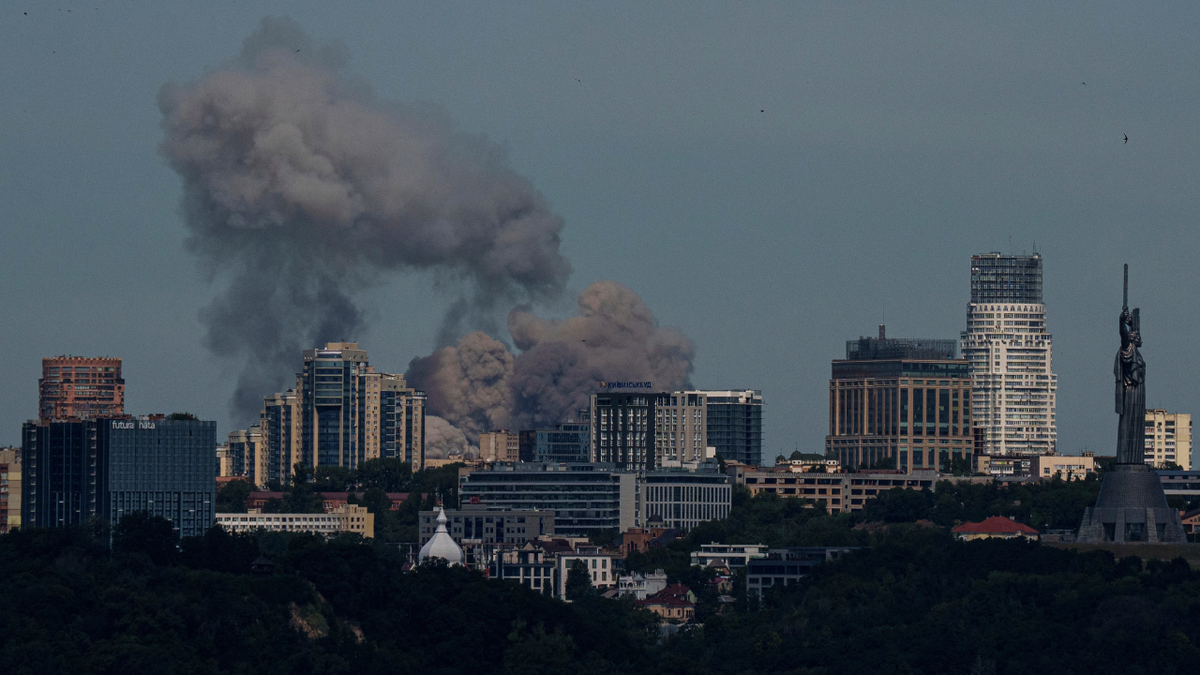
Smoke rises over the Kyiv skyline after a Russian attack, Monday, July 8, 2024. Russian forces launched multiple ballistic and cruise missiles against Ukrainian targets on Monday, Ukraine’s air force said, with explosions felt and heard across the capital, Kyiv. (AP Photo/ Evgeniy Maloletka)
Zelenskyy described the war as part of Putin’s broader attempt to impose a «different way of life» on the world.
«Stopping Putin today and preventing him from occupying Ukraine is a victory for the whole world,» he said.
However, when asked about the possibility of ceding the embattled Donbas region to Moscow as part of a peace deal, he warned that Russia would likely rebuild its military strength within «no more than a couple of years» and launch another invasion.
CLICK HERE TO DOWNLOAD THE FOX NEWS APP
«Where would he go next? We do not know, but that he would want to continue [the war] is a fact,» Zelenskyy said.
russia,ukraine
INTERNACIONAL
Asumió el nuevo primer ministro de Países Bajos: es el más joven de la historia y está en pareja con un argentino
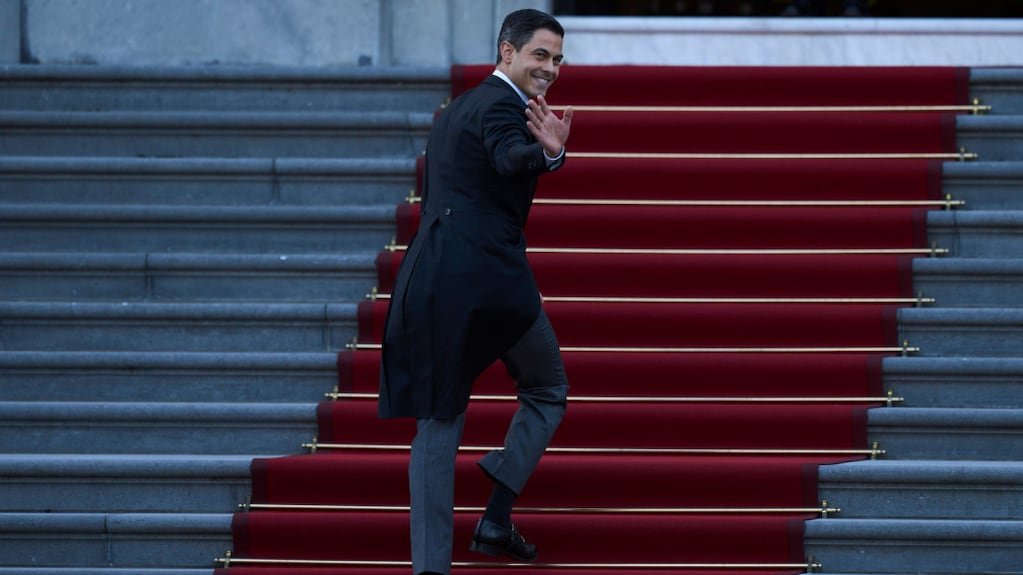
El liberal progresista Rob Jetten, pareja del jugador argentino de la selección masculina de hockey Nicolás Keenan, asumió este lunes como nuevo primer ministro de Países Bajos.
Jetten, líder de una coalición de centroderecha en minoría, juró el cargo ante el rey Guillermo Alejandro de Países Bajos, esposo de la reina Máxima Zorreguieta.
Leé también: Empezaron las obras de remodelación del Helicoide, el mayor centro de detención y torturas de Venezuela
De esa manera, comenzó una legislatura con una estabilidad cuestionada que dependerá de pactos con la oposición para sacar adelante su agenda.
Jetten, de 38 años, ganó las elecciones el 22 de octubre al imponerse al ultraderechista Geert Wilders. Así, se convirtió en el primer ministro más joven de la historia de su país.
Está comprometido con Nicolás Keenan, integrante de Los Leones, desde 2023. Hoy, el jugador argentino subió un video en sus redes sociales en el momento previo de la jura. .
Cómo será el nuevo gobierno neerlandés
El Ejecutivo de Jetten quedó investido tras la ceremonia de juramento ante el monarca en el palacio Huis ten Bosch, en la ciudad neerlandesa de La Haya, donde los ministros firmaron los decretos reales que formalizan el traspaso de poderes.
El gabinete, que gobernará en minoría, está compuesto por 18 ministros y 10 secretarios de Estado. Tras la ceremonia, los ministros posaron en la tradicional foto oficial en la escalera del palacio, una imagen reservada exclusivamente a los titulares de cartera y no a los secretarios de Estado.
El rey Guillermo junto al nuevo premier Rob Jetten y los nuevos miembros del gabinete (Foto: REUTERS/Peter Lous)
La distribución de cargos refleja el equilibrio interno de la coalición en base a la representación parlamentaria de cada partido socio del gabinete: el liberal de izquierdas D66 aporta diez miembros al gabinete, el liberal de derechas VVD nueve y el democristiano CDA ocho.
Completa el gabinete la independiente Sandra Palmen, secretaria de Estado responsable del proceso de reparación del escándalo de las ayudas sociales a padres con hijos.
Leé también: Ola de violencia en México: escaparon 23 presos del penal de Puerto Vallarta
En su cuenta personal, Jetten publicó una fotografía junto a los futuros representantes de D66 en el Ejecutivo, acompañada de un mensaje en el que expresó su “orgullo por asumir la responsabilidad de gobernar y su compromiso de construir lo que puede ir mejor” para todos los ciudadanos.
El nuevo gabinete inicia así una legislatura marcada por la necesidad de negociar con la oposición para sacar adelante sus iniciativas, en un Parlamento fragmentado que anticipa una legislatura exigente para el Ejecutivo recién investido.
Cuáles son las prioridades del nuevo gobierno
El acuerdo de gobierno, presentado a finales de enero, fija como prioridades el aumento del gasto en defensa hasta el 3,5% del PIB, un mayor control del asilo y un papel más activo de Países Bajos en la Unión Europea (UE), con especial énfasis en seguridad, tecnología (semiconductores) y autonomía.
En materia migratoria y de asilo, apuesta por una línea más restrictiva y coordinada a nivel europeo. Además, buscará que las solicitudes puedan tramitarse fuera de Europa, con la intención de reducir las llegadas y evitar que los procedimientos se desarrollen en territorio neerlandés.
El texto contempla acelerar procedimientos, reforzar centros de régimen estricto y, en caso de aumentar la presión migratoria, suspender temporalmente la reagrupación familiar.
Leé también: Escándalo en el Reino Unido: detuvieron al exembajador en EE.UU. por sus vínculos con Jeffrey Epstein
El nuevo gobierno también sitúa a la UE en el centro de su política exterior y defiende decisiones por mayoría cualificada en política exterior y seguridad, endurecer los mecanismos contra Estados miembros que vulneren los principios comunitarios y mantener el compromiso con el apoyo militar y financiero a Ucrania “de forma plurianual e ininterrumpida”.
El acuerdo señala que la relación transatlántica se mantendrá, aunque Países Bajos se reserva el derecho de “interpelar de forma creíble” a Washington cuando sus acciones afecten a valores e intereses europeos. Finalmente, defiende un mayor énfasis en sanciones y protección de tecnologías sensibles frente a países como Rusia, China e Irán.
(Con información de EFE)
Países Bajos
INTERNACIONAL
Former Secret Service officials warn of low-tech threats facing Trump after latest Mar-a-Lago breach
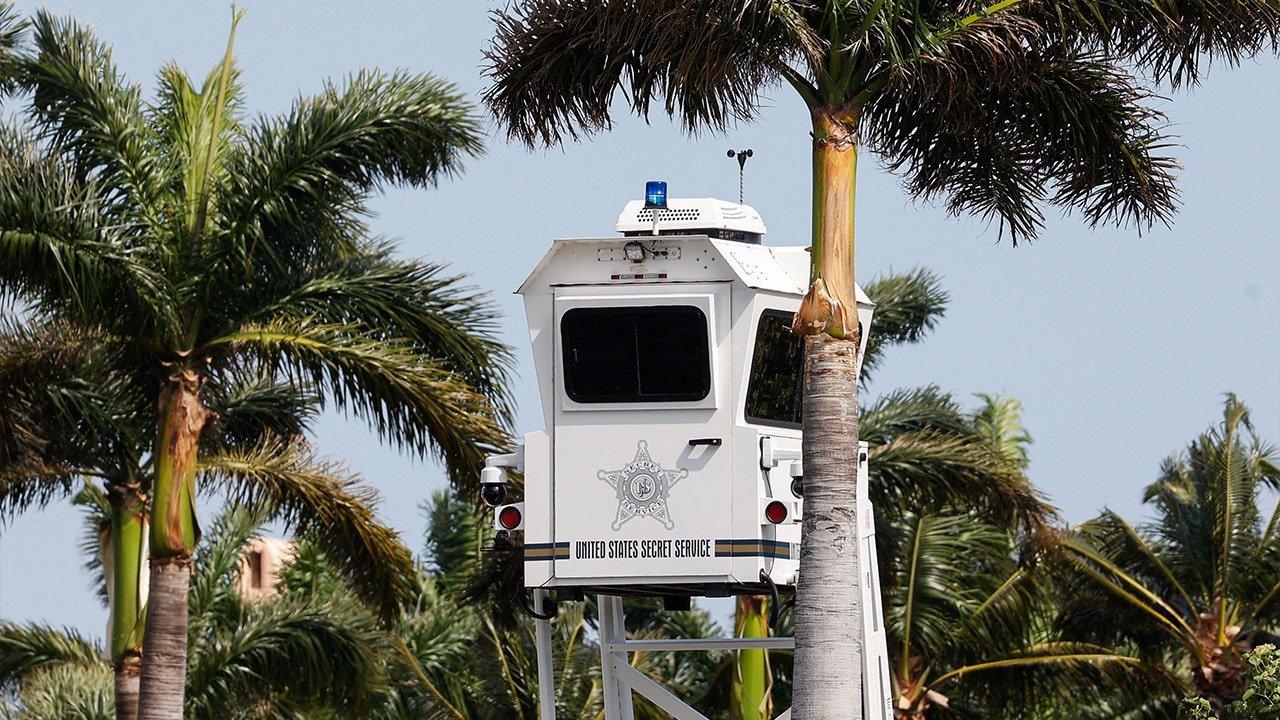
NEWYou can now listen to Fox News articles!
A deadly confrontation at Mar-a-Lago, Florida, Sunday is the latest in a string of high-profile security incidents threatening President Donald Trump, as former Secret Service officials warn that low-tech, lone actors now pose one of the toughest challenges to presidential protection.
«It should be quite clear to all of us by now that Trump is the most threatened president in the history of the U.S.,» former Secret Service agent William «Bill» Gage told Fox News Digital Monday, pointing to multiple high-profile incidents in recent years. Unlike past presidencies, where threat levels often subsided over time, Gage said, «the longer he’s president, the more these attacks keep happening.»
Gage said the most difficult cases to prevent are often the least sophisticated. The recent incidents, he noted, were «super low-tech attacks by people with zero training,» using rudimentary weapons. «If you were standing behind them in line at Starbucks, you wouldn’t have given them a second look,» he said.
Gage said the threat landscape shifted over the course of his 12-year career as a Secret Service agent. When he joined the Secret Service in 2002, he said the agency was moving away from what he described as the traditional «lone gunman» model — figures like Lee Harvey Oswald, who assassinated John F. Kennedy, or international militants such as «Carlos the Jackal,» one of the world’s most wanted terrorists in the ‘70s and ’80s — and adapting to a post-9/11 world focused on coordinated terrorist networks like al Qaeda and later ISIS.
A deadly confrontation at Mar-a-Lago, Florida, Sunday is the latest in a string of high-profile security incidents involving President Donald Trump. (Marco Bello/Reuters)
«But if you look at Butler and the two incidents at Mar-a-Lago, those were super low-tech attacks,» Gage said. «The low-tech actors are the ones that tend to slip through the cracks.»
He also warned of a potential copycat effect when details of such incidents become public.
«If it were up to the Secret Service, they would never report any of these incidents ever,» Gage said, arguing that widespread coverage allows others to «study what happened» and attempt to refine it.
In today’s hyperconnected political climate, he said, that dynamic adds another layer of complexity for agents trying to stop the next threat before it materializes.
In the early hours of Sunday, a 21-year-old man identified as Austin Tucker Martin of North Carolina was shot and killed by U.S. Secret Service agents and a local sheriff’s deputy after entering the secure perimeter of Trump’s Mar-a-Lago resort in Palm Beach, Florida.
Authorities say Martin drove through the north gate carrying a shotgun and a gasoline can. After being ordered to drop both, he dropped the can but raised the shotgun toward officers, who fired and killed him at the scene. Trump and First lady Melania Trump were in Washington at the time.
The incident marked the third highly publicized security encounter involving Trump in less than two years.
In July 2024, a gunman opened fire at a campaign rally in Butler, Pennsylvania, grazing Trump’s ear and killing an attendee before being shot by a Secret Service sniper.
In September 2024, a man armed with a rifle was confronted by agents near Trump’s golf course while he was playing; that suspect was later convicted on attempted assassination charges.
While the incidents have drawn intense attention, former Deputy Assistant Director Don Mihalek said the latest Mar-a-Lago intrusion does not necessarily signal a breakdown in protective systems.
«He got through an exterior gate of an active club,» Mihalek told Fox News Digital. «This wasn’t someone reaching the president’s residence.»
Agents confronted the suspect within seconds, he said, describing the rapid response as evidence that overlapping security layers functioned as designed.
Mihalek said presidential protection relies on multiple rings of security because outer perimeters at properties like Mar-a-Lago cannot be sealed in the same way as the White House.
«If he ended up in the president’s house on Mar-a-Lago, that might be a different conversation,» he said.
He also cautioned against viewing recent incidents in isolation, noting that presidents routinely face roughly 2,000 threats per year, most of which are mitigated before the public ever becomes aware of them.
«These just happen to be very public instances,» Mihalek said, arguing that the social media era amplifies perceptions of escalation.

Then-Republican presidential candidate Donald Trump is whisked away by Secret Service after shots rang out at a campaign rally at Butler Farm Show Inc. July 13, 2024, in Butler, Pennsylvania. (Jeff Swensen/Getty Images)
GUNFIRE, ARSON AND VANDALISM: TRACKING POLITICAL VIOLENCE IN AMERICA
Mihalek pointed to the 2024 rally shooting in Butler, Pennsylvania, as an example of how early intervention can be decisive, noting that local law enforcement had reportedly identified the suspect prior to the attack.
«If somebody had walked up and said, ‘Hey, who are you?’ we wouldn’t be talking about Butler,» he said.
As Trump prepares to address Congress at the State of the Union, both former officials said the security posture at the Capitol is unlikely to change in response to the weekend incident.
The annual address is designated a National Special Security Event — the highest level of federal security planning — triggering coordination among the Secret Service, U.S. Capitol Police, FBI, War Department and other agencies. The designation allows for expanded perimeter controls, airspace restrictions and continuity-of-government planning.

Barricades go up around the Capitol ahead of the State of the Union. (Kylie Cooper/Reuters)
CLICK HERE TO DOWNLOAD THE FOX NEWS APP
Gage, who previously led advance planning for State of the Union addresses, said the event operates under a well-established security «blueprint» built to account for worst-case scenarios. «There’s really no way to increase it anymore,» he said.
Both former officials said the defining challenge for presidential protection today is unpredictability: individuals with minimal training, rudimentary weapons and the ability to find reinforcement online. Unlike organized extremist networks, such actors may leave few detectable signals before acting.
homeland security,national security,donald trump

 ECONOMIA3 días ago
ECONOMIA3 días agoVillarruel cuestionó la apertura de importaciones: «Sin industria, se pasa a depender de China»

 POLITICA2 días ago
POLITICA2 días ago“Ahora es la hora de jugarse”: el mensaje de Patricia Bullrich a los empresarios tras aprobarse la reforma laboral

 ECONOMIA2 días ago
ECONOMIA2 días agoSegún un especialista, el precio de la carne se mantendrá alto “entre dos y tres años”





